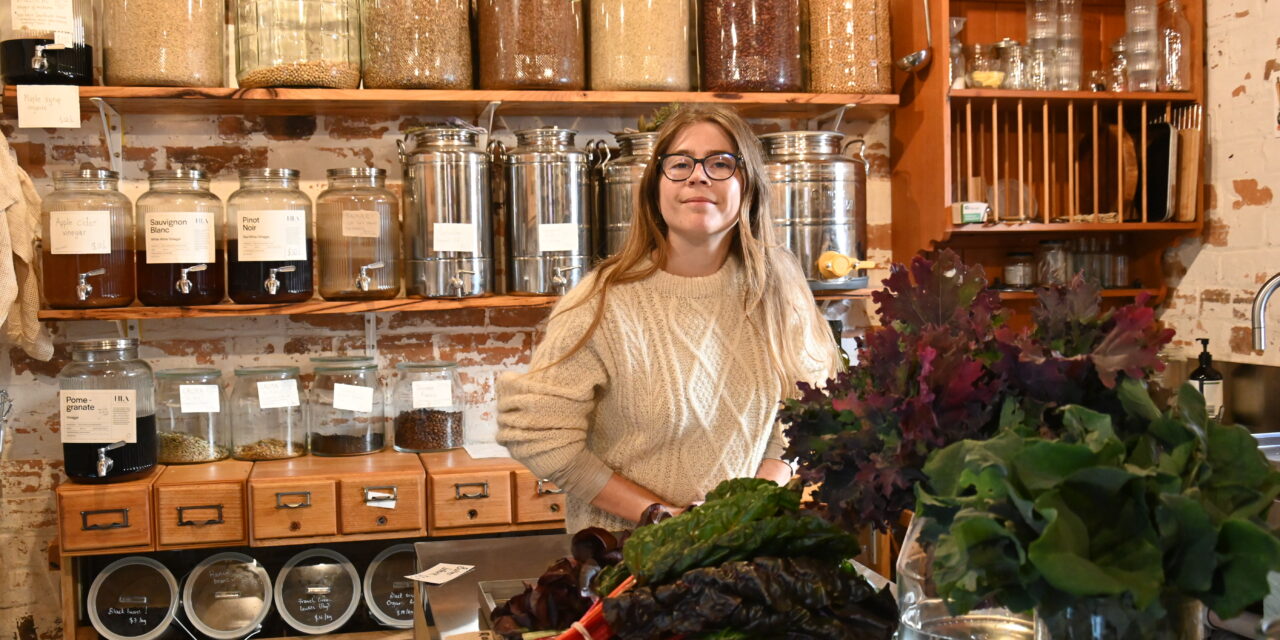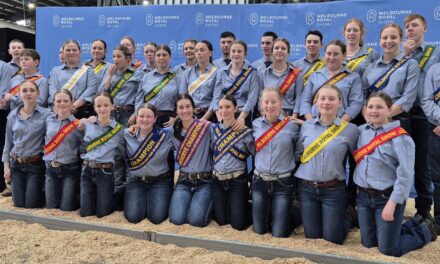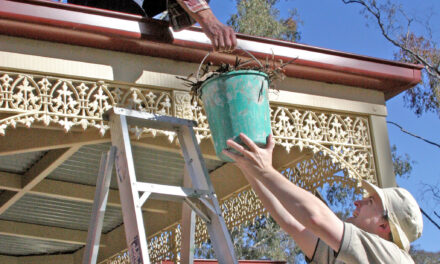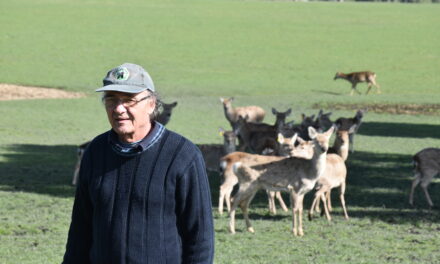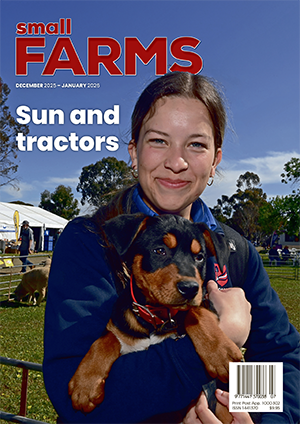The building may be non-descript to passers-by, but inside, a dedicated team is working to make food access equitable for everyone, as ANDY WILSON discovered.
“People think they need to deserve food, but in reality no-one should ever think they have to earn it.”
And on that basis, the mission that Brontë Haines has brought together at Avenel’s Fair Food & Wildflowers stands well apart from anything.
Uncharted waters come to mind for the customer because the concept takes several visits to really understand.
It is unique: the six-month-old enterprise cannot be defined simply as a nursery-cum-providore-cum-community garden outlet.
And that’s because the path Brontë and her ‘gorgeous’ team of three have followed is grounded on a philosophy for which she has the academic smarts.
If it were art, it would be a genre of its own.
Nestled between the post office and a 150-year-old antiques boutique in the heart of Avenel, across from the historic original post office and railway crossing, Fair Food & Wildflowers may be non-descript on passing by — “milk on tap” is announced simply enough on a sandwich board — but it is worth visiting to learn about the ethos behind it all.
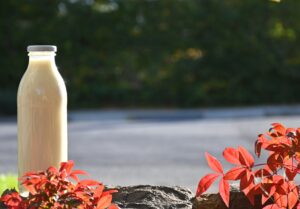
Brontë has returned to her family farm, having grown up at Wahring (“where my heart is”), after a 10-year academic journey that culminated with a master’s degree in environmental restoration.
On weekdays you can find Brontë at the Euroa Arboretum, where her expertise contributes to grassland conservation and the seedbank of local plant species.
That takes care of the botanist in her.
On weekends, she welcomes visitors to Fair Food & Wildflowers, where you’ll find her buzzing around the central counter (which side should I stand?) inside an old dairy she spent 12 months renovating with a friend from Melbourne.
“It’s probably the oldest brick building in Avenel,” she said.
The renovations paid off: the walls have had the paint sanded back to bring the brickwork alive, and the shop is lined, wall-to-wall, with gleaming glass cannisters of a range of dried and fresh condiments, herbs, spices, nuts and anything else.
The counter holds trays of the weekend’s fresh fare: today it is two types of kale, carrots, bagels, dill, chard and plenty of Jerusalem artichokes.
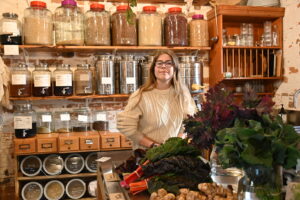
Hanging threateningly above are bunches of dried chillies.
Brontë is busy rolling fresh dolmades and I sample one (do yourself a favour).
The team of three who helped with founding the shop warrant naming: Leah Martini, Geoff Kruck and Nelly Watson.
Was it difficult to get them on board?
“Absolutely not,” Brontë said.
“Geoff came to me actually and asked: ‘can I help?’
“That was sweet.
“For Leah it was very natural, and Nelly was working at the Longwood store and also works with me at the arboretum.”
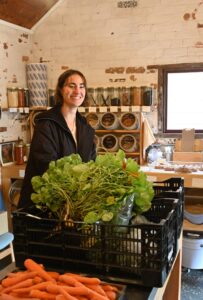
The concept is nothing new to Nelly, who has worked in the open food network before, delivering food.
“I have long been in the food availability scene,” Nelly said.
“I believe keeping it local is very important, so I was very excited when Brontë opened the shop.”
The team helps give Brontë more time to prepare a variety of other food, such as baklava and haloumi.
And if you get them started on cheesemaking, find a comfortable chair and don’t brag about your own efforts.
Nelly’s partner Aidan also contributes with fermented foods, such as his home-made sauerkraut and chilli oil all dreamt up in his commercial kitchen.
The team operates the shop and courtyard from 10am to 4pm on Fridays and weekends.
The renovations came with useful perks, not least the extra qualification Brontë can tuck away for a useful day, like when she could call on herself to install the chilled milk tap.
“And it’s a good excuse to get a full set of tools,” she said.
A masters degree in environmental restoration rounded off the academic part of the journey and Brontë returned home a couple of years ago to start work at the arboretum “once I knew I had enough knowledge to not be dangerous”.
However, her bachelor degree in nutrition from Melbourne University drives the ethos of the shop, particularly her honours project in public health.
“I was working with people seeking asylum, researching the role of food charity to address food insecurity,” Brontë said.
“Any time you have any distinction between people who can and cannot access food, as much as you try to make it as dignified as possible, once you notice a gap between who can and cannot afford food, it creates a stigma.
“But there is so much food, there is an abundance.
“It’s only in the supply chain and the access points that there are inadequacies and inequality, so the desire of the shop is to address the question: is there a way to make food access equitable for everyone?”
On this, Brontë chooses her words with intent, avoiding food ‘availability’ (replaced with ‘access’) and food swapping (gifting), and she shuns any parallel with a food bank.
“Charity” is right out.
“I once worked at Melbourne University’s community garden and people would say they didn’t have anything to swap,” Brontë said.
“This word, ‘swap’, was difficult, so now I use the word ‘gift’.
“I guess I want to demonstrate the fact that food is abundant.”
One anecdote is that of a customer asking if there was any aloe vera gel available in jars.
“I said no but we have free aloe in the garden for them to take a stem from. They then realised they had their own growing at home, so that’s what they used.
“Another woman wanted to buy some poppy seeds and I explained they were very difficult for me to source but they could be easily grown at home.
“She then said ‘oh, I actually grow poppies, I should have plenty’.
“Those are the kind of interactions that interest you.”
Because food is gifted to the store from gardeners who have surplus, food can be gifted out in return. Whether or not it is matched in the exchange does not matter.
The bourgeois look to the store draws the obvious assumptions about price, but Fair Food & Wildflowers has a mix of priced food and gifted food.
“The idea is that you should be able to afford the same amount of a mixed bag of food as going to the supermarket, if about 30 per cent of what you get here is free,” Brontë said.
“So, the pasta is cheaper, but the dairy may be higher priced, for example.”
I beg to differ: my glass bottle of milk was worth every dime. In fact, the one litre didn’t make it home and I found myself back the next day for a refill.
It is quite the novelty: a modern, push-button dispenser pours forth a chilled full-cream stream into a glass bottle.
The taste takes me back to childhood and I wonder about it aloud.
“The calf is left on the mother and so the milk is shared,” Brontë explained.
I’ll believe it.
The milk is supplied by Cathy Palmer at Shepparton’s How Now Dairy, which also practices herd preservation with any offspring.
“Cathy does not slaughter any calves. She has a retirement farm to keep all of them alive,” Brontë said.
“I once bought some Hindu milk in Melbourne because it was a no-slaughter product and then found out that Cathy actually provided it.”
Brontë admits the whole experience at Fair Food & Wildflowers can be a ‘difficult’ learning curve for customers.
“It can be confronting for people to get used to coming in and shopping, but I want people to see the abundance around them and feel the joy of sharing that,” she said.
“It’s a physical space and a garden to offer people a different way to think about the food system and different ways to interact with it.
“There is no distinction, for example, about where you need to be in the store — which side of the counter do you stand on? It doesn’t matter.”
That answers that one.
“There is absolutely no obligation to swap for gifted food. I would hate for people to feel there was an obligation.
“I want people to feel comfortable with what they need and what they want.”
Nelly said that although the regulars were getting used to the concept, a customer recently did not want to take some fennel for free.
“They wanted fennel and since the fennel we had was gifted to the store by a grower, there was no charge, but because that was all they wanted, they did not feel comfortable to take it,” Nelly said.
“I said ‘don’t’ because this is not what it’s about.”
The shop is making plans for a widening of its scope, with the co-ordination of a team of harvesters in spring to find fruit in neglected private orchards that would otherwise go to waste.
Aside from the degrees, Brontë admits that the greatest influence on her has been the writings of US bryologist (moss expert) Robin Wall Kimmerer, whose classic The Democracy of Species is considered part of the canon of modern environmental literature.
Kimmerer is known for writing extensively on the ‘gift economy’.
“A long time ago I also thought about bioregionalism,” Brontë said.
“That’s a type of ethos that asks what is the best kind of work you can do?
“I feel that the best impact you can have can be in your own community.
“But it can be so overwhelming with so much that needs addressing, therefore you need your boundaries and you need the feedback instead of shouting into the ether.”
Regular feedback from customers follows the line: ‘I always feel better when I come here’.
But does Brontë miss the feedback from a different sphere? A female fairy wren bounces through the arboretum door and delights everyone.
“Oh her. Yesterday she landed on my laptop screen while I was writing, to say hello.”
The mission is sound.
One gets the feeling that this will catch on.

